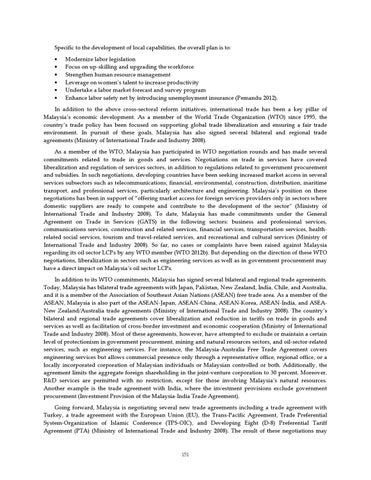Specific to the development of local capabilities, the overall plan is to:
Modernize labor legislation Focus on up-skilling and upgrading the workforce Strengthen human resource management Leverage on women’s talent to increase productivity Undertake a labor market forecast and survey program Enhance labor safety net by introducing unemployment insurance (Pemandu 2012).
In addition to the above cross-sectoral reform initiatives, international trade has been a key pillar of Malaysia’s economic development. As a member of the World Trade Organization (WTO) since 1995, the country’s trade policy has been focused on supporting global trade liberalization and ensuring a fair trade environment. In pursuit of these goals, Malaysia has also signed several bilateral and regional trade agreements (Ministry of International Trade and Industry 2008). As a member of the WTO, Malaysia has participated in WTO negotiation rounds and has made several commitments related to trade in goods and services. Negotiations on trade in services have covered liberalization and regulation of services sectors, in addition to regulations related to government procurement and subsidies. In such negotiations, developing countries have been seeking increased market access in several services subsectors such as telecommunications, financial, environmental, construction, distribution, maritime transport, and professional services, particularly architecture and engineering. Malaysia’s position on these negotiations has been in support of “offering market access for foreign services providers only in sectors where domestic suppliers are ready to compete and contribute to the development of the sector” (Ministry of International Trade and Industry 2008). To date, Malaysia has made commitments under the General Agreement on Trade in Services (GATS) in the following sectors: business and professional services, communications services, construction and related services, financial services, transportation services, healthrelated social services, tourism and travel-related services, and recreational and cultural services (Ministry of International Trade and Industry 2008). So far, no cases or complaints have been raised against Malaysia regarding its oil sector LCPs by any WTO member (WTO 2012b). But depending on the direction of these WTO negotiations, liberalization in sectors such as engineering services as well as in government procurement may have a direct impact on Malaysia’s oil sector LCPs. In addition to its WTO commitments, Malaysia has signed several bilateral and regional trade agreements. Today, Malaysia has bilateral trade agreements with Japan, Pakistan, New Zealand, India, Chile, and Australia, and it is a member of the Association of Southeast Asian Nations (ASEAN) free trade area. As a member of the ASEAN, Malaysia is also part of the ASEAN-Japan, ASEAN-China, ASEAN-Korea, ASEAN-India, and ASEANew Zealand/Australia trade agreements (Ministry of International Trade and Industry 2008). The country’s bilateral and regional trade agreements cover liberalization and reduction in tariffs on trade in goods and services as well as facilitation of cross-border investment and economic cooperation (Ministry of International Trade and Industry 2008). Most of these agreements, however, have attempted to exclude or maintain a certain level of protectionism in government procurement, mining and natural resources sectors, and oil-sector-related services, such as engineering services. For instance, the Malaysia-Australia Free Trade Agreement covers engineering services but allows commercial presence only through a representative office, regional office, or a locally incorporated corporation of Malaysian individuals or Malaysian controlled or both. Additionally, the agreement limits the aggregate foreign shareholding in the joint-venture corporation to 30 percent. Moreover, R&D services are permitted with no restriction, except for those involving Malaysia’s natural resources. Another example is the trade agreement with India, where the investment provisions exclude government procurement (Investment Provision of the Malaysia-India Trade Agreement). Going forward, Malaysia is negotiating several new trade agreements including a trade agreement with Turkey, a trade agreement with the European Union (EU), the Trans-Pacific Agreement, Trade Preferential System-Organization of Islamic Conference (TPS-OIC), and Developing Eight (D-8) Preferential Tariff Agreement (PTA) (Ministry of International Trade and Industry 2008). The result of these negotiations may
151
